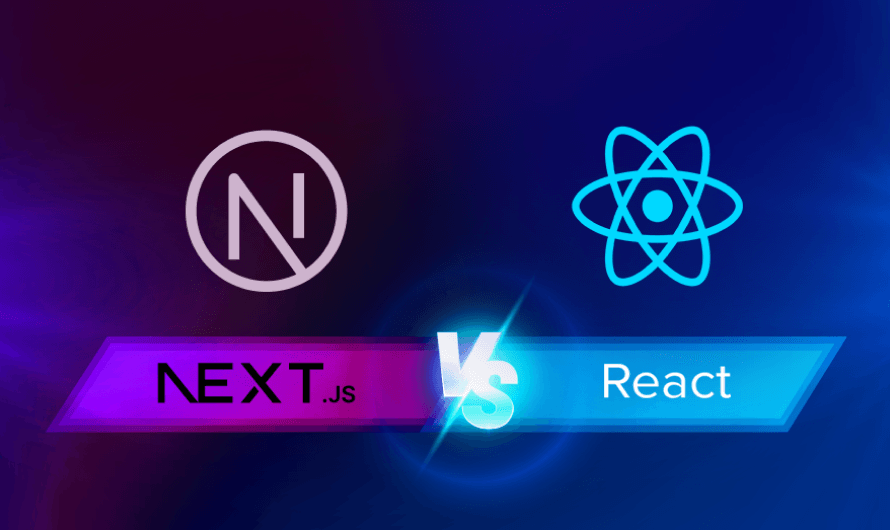In the realm of web development, the choice between Next js vs React is pivotal.
This article delves deep into the distinctions and comparisons between these two technologies. From their core features to performance benchmarks, we'll explore every facet.
Whether you're a developer seeking insights or a business making an informed decision, our in-depth analysis of Next.js and React will shed light on the similarity and difference between react and nextjs that define their roles in modern web development.
Join us as we navigate the landscape of react vs next js to help you make the right choice for your projects.
What is Next JS?
Answering the question of what is next.js, it is a robust framework that extends the capabilities of React in web development.
Born from the React ecosystem, Next.js is a prevalent JavaScript framework that simplifies building robust and performant web applications.
It serves as a dynamic platform for creating both server-rendered and static websites, seamlessly integrating with React components.
By addressing challenges such as server-side rendering and routing, Next.js enhances the React-based application development process.
With its intuitive features and optimizations, Next.js empowers developers to effortlessly create interactive and SEO-friendly websites, making it a remarkable advancement in the ever-evolving landscape of web development.
Features of Next.js
Next.js, a dynamic framework in the React ecosystem, comes packed with an array of features that streamline and enhance the web development process.
1.Server-side Rendering (SSR): One of Next.js' standout features is SSR, where pages are rendered on the server. This improves page load speed and SEO, ensuring content is accessible to search engines and users alike.
2.Static Site Generation (SSG): With SSG, Next.js generates static HTML files at build time. This offers quicker loading times and can be a fallback for server-rendered pages.
3.Routing: Next.js provides simple, customizable routing, removing the need for additional routing libraries. This ensures efficient navigation and smoother user experiences.
4.Hot Module Replacement (HMR): HMR allows real-time module updates without requiring a full page reload. This speeds up development iterations and enhances productivity.
5.Automatic Code Splitting: Next.js automatically splits code into smaller chunks, optimizing page load times by loading only the necessary code.
6.API Routes: It offers built-in API routes, enabling easy creation of backend functionality without a separate backend server.
7.CSS Modules and Styled-jsx: Next.js supports CSS Modules and styled-jsx, simplifying styling while ensuring scoped and performant CSS.
These features collectively elevate development by combining React's flexibility with server-side rendering and performance optimizations.
The choice between next.js vs react depends on project requirements, with Next.js providing an edge in scenarios demanding improved SEO, performance, and efficient development workflows.
What is React?
React is a renowned JavaScript library designed to simplify and optimize the creation of user interfaces. As a core component in web development, it excels in building dynamic and interactive UIs.
React revolves around fundamental principles like component reusability, a declarative approach, and an efficient rendering system.
Speaking of react router dom vs next js, one of React's pivotal innovations is the Virtual DOM. Instead of directly manipulating the actual DOM, React creates a virtual representation.
When data changes, React compares the virtual DOM with the real DOM and updates only the necessary parts, minimizing costly re-renders and enhancing performance.
When comparing nextjs vs react, it's important to note that Next.js builds on React's capabilities by adding features like server-side rendering and routing.
The significant difference between react and next js is that React is the foundation, while Next.js extends its functionality for more complex scenarios, making it an excellent choice for SEO-friendly, high-performance web applications.
Features of React
React, a widely-used JavaScript library offers a plethora of features that make it a go-to choice for modern web development. Its advantages include:
1.Component-Based Architecture: React's core principle is the creation of modular, reusable components. These encapsulated components can be composed to build complex user interfaces, streamlining development and enhancing code organization.
2.Virtual DOM for Efficiency: React introduces the Virtual DOM, which optimizes rendering. When data changes, React compares the virtual representation of the DOM with the actual DOM, minimizing unnecessary updates and improving performance.
3.Unidirectional Data Flow: React enforces a one-way data flow, making it easier to manage and track changes in the application's state. This simplifies debugging and ensures predictable behavior.
4.Declarative Syntax: React's declarative approach allows developers to describe how the UI should look at any given state. This enhances code readability and maintainability.
5.Performance Benefits: React's Virtual DOM and selective rendering minimize the need for full-page reloads, leading to faster and smoother user experiences.
When comparing next js vs react performance, it's essential to recognize that Next.js builds upon React's strengths, offering additional features like server-side rendering and automatic code splitting.
Both technologies aim to enhance web application performance, with Next.js extending React's capabilities for SEO optimization and efficient server-side rendering.

Difference Between React and Next JS
React and Next.js are both powerful tools in the realm of web development, but they serve different purposes while building user interfaces and web applications.
Let's explore their similarities, differences and how Next.js extends React's capabilities.
Similarities:
- React Foundation: Both React and Next.js are built on top of React's foundation. React is a JavaScript library for building user interfaces, while Next.js is a framework that enhances React applications with additional features.
- Component-Based: Both platforms follow a component-based architecture, allowing developers to create modular and reusable UI elements.
- JavaScript: React and Next.js are both JavaScript-based, making them accessible to a wide range of developers familiar with the language.
Differences:
1.Server-Side Rendering (SSR): One major difference between react and nextjs is that Next.js provides built-in server-side rendering. This means that Next.js applications can render pages on the server, improving SEO and initial page load times. React, on the other hand, is primarily a client-side library generating content on the browser.
2.Routing: Next.js offers server-side routing out of the box, simplifying the process of creating dynamic routes. React doesn't include routing capabilities by default, but third-party libraries are available for this purpose.
3.File Structure and Conventions: Next.js enforces specific file structures and conventions to facilitate easy development and deployment. React projects have more flexibility in terms of file organization.
Extending React with Next.js:
- Next.js builds upon React's foundation by adding features like server-side rendering, automatic code splitting, and optimized routing.
- These enhancements allow developers to create faster, more SEO-friendly applications without manually setting up these features.
In essence, while React is a powerful library for building dynamic user interfaces on the client-side, Next.js extends React's capabilities by providing server-side rendering and routing solutions, making it an excellent choice for building complex, high-performance web applications.
Choosing between next js vs react depends on the project's requirements, with React suitable for client-side rendering and Next.js excelling in projects that require server-side rendering and optimized routing.
Advantages and Disadvantages of Next JS and React
Selecting the right technology stack is pivotal for successful web development. In the case of react vs next js, understanding their strengths and weaknesses is essential.
Here, we offer a comprehensive view to aid in making well-informed decisions for your projects.
Advantages of Next.js:
1.Server-Side Rendering (SSR): The built-in SSR of Next.js enhances SEO by improving search engine visibility and initial page load performance.
2.Automatic Code Splitting: Next.js automatically divides code into smaller chunks, boosting performance by loading only necessary components as users navigate across pages.
3.Routing Simplicity: Next.js offers a seamless and intuitive routing system, making navigation between pages straightforward.
4.Quick Setup: With predefined file structures and conventions, Next.js accelerates the development process by reducing setup complexities.
Disadvantages of Next.js:
1.Learning Curve: While React has its learning curve, Next.js introduces additional concepts like SSR and routing, requiring more time to master.
2.Client-Side Limitations: Next.js emphasizes server-side rendering, which might limit advanced client-side interactivity.
Advantages of React:
1.Vast Community and Ecosystem: React boasts a massive and active community, resulting in a plethora of resources, libraries, and third-party components.
2.Flexibility: React empowers developers to create custom setups and file structures tailored to specific project needs.
3.Client-Centric Approach: React excels in applications where intricate client-side interactions are pivotal, offering responsive and dynamic user experiences.
Disadvantages of React:
1.Initial Load Time: Since React predominantly focuses on client-side rendering, initial page load times might be slower, although strategies like server-side rendering can alleviate this concern.
2.Manual Configuration: React often requires manual setup for features like SSR and routing, and these might necessitate third-party libraries.
The choice between next js vs react hinges on project requirements. Next.js shines for content-rich websites that demand optimal SEO and initial loading, while React is apt for applications prioritizing complex client-side interactions and customization.
Evaluating these aspects vis-à-vis project objectives is paramount to achieving an optimal technology fit and creating successful web applications.

Which is Best Next JS or React JS?
The question of React js vs Next js often arises in the web development realm. The answer, however, isn't a straightforward one-size-fits-all solution. The decision hinges on your project's unique requirements, priorities, and goals.
Next.js shines when:
- SEO and Performance Matter: If SEO is paramount and you seek lightning-fast initial page loads, Next.js, with its server-side rendering (SSR), is a strong contender.
- Rapid Development: For quicker setups and more straightforward routing, Next.js streamlines development, making it a preferable choice for specific time-sensitive projects.
React JS excels when:
- Client-Side Interactivity: When your project heavily relies on complex client-side interactions, React's flexibility and component-driven architecture offer a robust solution.
- Customization and Ecosystem: React's vast ecosystem provides the freedom to tailor setups, offering flexibility to create your desired application structure.
Ultimately, the decision boils down to project specifics. While Next.js offers SEO advantages and performance benefits through SSR, React JS shines with its versatility and rich ecosystem.
It is pivotal to assess your project's priorities, be it initial load time, SEO optimization, or intricate client-side interactions.
So, the next time you're at the crossroads of Next js vs React js, remember to align your choice with your project's unique characteristics for optimal results.
When to Use React Over Next.js?
Opting for React over Next.js is advantageous when intricate client-side interactions and diverse customization are your focal points.
If your project prioritizes crafting complex user interfaces with dynamic, client-side-heavy features, React's component-driven approach and versatile ecosystem provide a strong foundation.
Moreover, industries requiring highly customized applications, like social media platforms or unique enterprise software, often lean towards React.
Its adaptability and rich tools cater to varied needs, making it the go-to choice for projects where scalability, customization, and intricate front-end functionality reign supreme.
While Next.js brings SEO and initial performance advantages, React remains the champion for projects demanding unparalleled flexibility and a broader spectrum of customization options.
Best Use Cases for React
When choosing whether to create react app vs next js, React shines in many scenarios, making it a top choice for versatile web applications.
For instance, content-heavy platforms like news websites benefit from React's ability to efficiently update and render dynamic content without reloading the entire page.
eCommerce sites leverage React's component reusability and real-time updates for smooth user experiences.
React's flexibility also suits building single-page applications (SPAs) and complex user interfaces where responsiveness and interactive components are paramount.
Speaking of react ssr vs next js, while Next.js excels in SEO and server-side rendering, React's robustness and adaptability find their sweet spot in these diverse use cases.
When to Use Next.js Over React?
Answering the question why use next js over react, Next.js shines in scenarios where server-side rendering (SSR) and search engine optimization (SEO) are paramount.
E-commerce platforms with dynamic content benefit from Next.js's SSR, ensuring faster loading times and better SEO rankings.
Content-heavy websites, like blogs and news sites, appreciate Next.js's ability to render content on the server, enhancing user experience.
Additionally, media, publishing, and content marketing industries leverage Next.js to deliver engaging and SEO-friendly pages.
When considering performance and SEO in dynamic web applications, Next.js's pre-rendering capabilities make it a strategic choice.
Best Use Cases for Next.js
What is nextjs's primary speciality is that it excels in building complex, high-performance applications that require server-side rendering (SSR) and optimal user experience.
eCommerce platforms with dynamic product listings benefit from Next.js's SSR for SEO and faster loading times. Content-rich websites like blogs or news portals leverage Next.js to ensure SEO-friendly content rendering.
Applications demanding real-time updates like financial dashboards can rely on Next.js for seamless data presentation.
By offering pre-rendering, Next.js optimizes performance and SEO, making it an ideal choice for dynamic web applications.
The Bottom Line
In summary, our exploration has illuminated the key similarity and difference between react and nextjs.
Next.js enriches React with features like server-side rendering for enhanced performance, while React stands out for its component-based architecture and versatility.
Your decision between react vs next js hinges on your project's unique needs, such as performance optimization and development scope.
Consider factors like React js vs Next js performance and their differences. Tailoring your choice to your specific project goals and requirements is paramount.
We encourage you to seek professional insights when making this decision, ensuring a well-informed choice that aligns with your web development endeavors.
Relevant Articles:













































